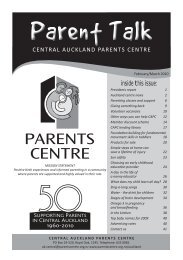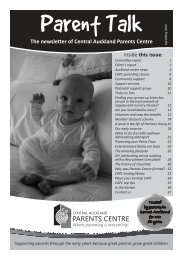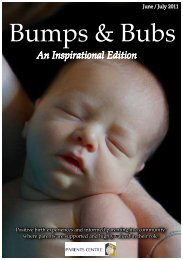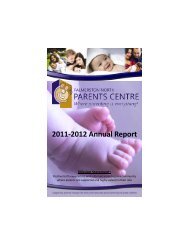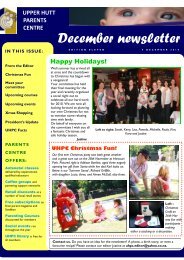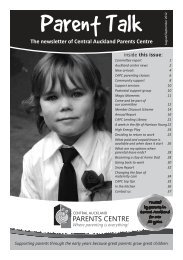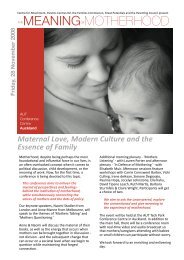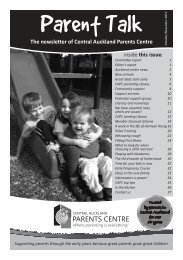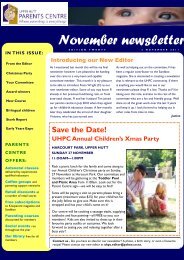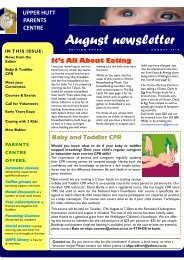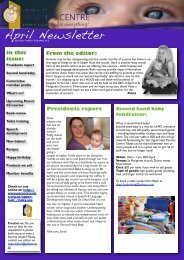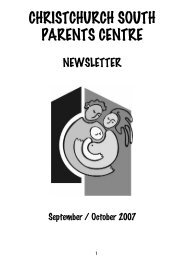October/November 2012 Timaru Tots - Parents Centres New ...
October/November 2012 Timaru Tots - Parents Centres New ...
October/November 2012 Timaru Tots - Parents Centres New ...
Create successful ePaper yourself
Turn your PDF publications into a flip-book with our unique Google optimized e-Paper software.
TIMARU TOTS PAGE 24<br />
are fantastic, particularly<br />
for long car rides. The<br />
reader often uses different<br />
character voices and<br />
intonation, there are sound effects and the<br />
expression in the reading which can really<br />
engage the listener. Good examples of these<br />
are Giraffes Can’t Dance written by Giles<br />
Andreae and read by Hugh Laurie, Beware<br />
of Story Book Wolves written by<br />
Lauren Child and read by Hugh Laurie.<br />
Language development includes the ability<br />
to understand what is said and speaking<br />
to others. This in turn leads to an<br />
understanding of written language and being<br />
able to read and write.<br />
Early Writing occurs from between 12-18<br />
months. Young children will “scribble”, first<br />
striking in vertical lines and then move onto<br />
circular motions. For this to happen young<br />
children need access to chalk and crayons –<br />
big thick chunky chalk and crayons as they<br />
don’t have the fine motor skills to control<br />
the thin size. From 12-15 months onwards<br />
give your child the opportunity to explore<br />
these.<br />
The first word your child will write is their<br />
own name, so it is important you have this<br />
displayed for them in correct letter formation.<br />
Eg Samuel not SAMUEL They will begin<br />
to recognise their own name and when<br />
ready anywhere from 3-5 years of age<br />
will have a go at writing it.<br />
“Teach your child to love reading, children<br />
should go to school with an understanding of<br />
how print works, as well as a love of books<br />
and the knowledge and entertainment they<br />
provide.” Mem Fox<br />
I suggest that parents make times in the day<br />
for books – not only at bedtime. Your children<br />
are often most receptive first thing in<br />
the morning, so if you can make the time<br />
first thing to snuggle in bed and read a book<br />
or two this is fabulous. Your child’s brain is<br />
awake, very receptive and ready to<br />
absorb.<br />
Try and use lots of expression<br />
when you are reading, if you are<br />
excited about what you are reading<br />
your child is likely to get excited<br />
also. Give characters voices,<br />
use sound effects and discuss the illustrations.<br />
Also, pausing during reading has been<br />
proven to be a great motivator of verbalising<br />
ideas i.e. the parent pauses after each sentence<br />
or idea, which gives a child time to<br />
think and articulate what he/she is thinking<br />
about.<br />
Have books accessible in many areas of your<br />
home, not only in your child’s bedroom. Ask<br />
relatives and friends to gift books for Christmas<br />
and birthdays. Take your child to the<br />
library and borrow books for both of you.<br />
“Children who come from homes surrounded<br />
in books are more likely to succeed than<br />
those who don’t” Mem Fox.<br />
Aim for 3 books a day as<br />
Mem Fox suggests in her<br />
book titled Reading Magic –<br />
How your child can learn to<br />
read before school and other<br />
read aloud miracles.<br />
As your child gets older she suggests 1 favourite<br />
book, 1 book that the child has heard<br />
before and 1 new book.



